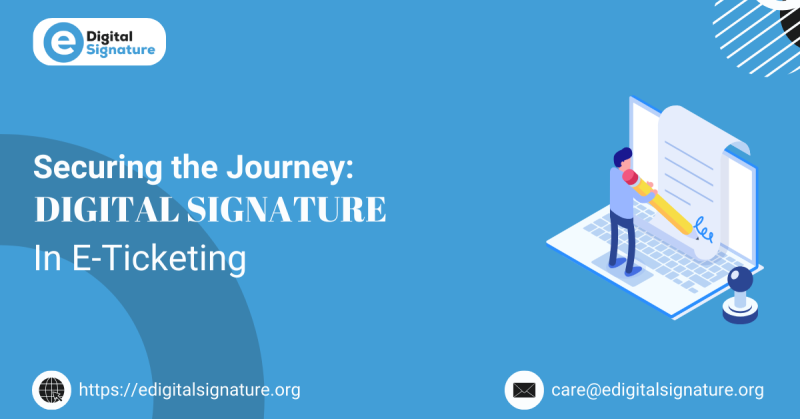In the digital era, the way we conduct transactions and manage documentation has dramatically transformed. One notable change is in the travel and transportation industry, where e-ticketing has become the norm. To ensure the authenticity and security of these electronic tickets, the use of Digital Signature Certificates (DSCs) has become increasingly significant. A Digital Signature Certificate provides a secure and efficient method to validate the identity of the parties involved in electronic transactions, thereby enhancing trust and reliability in the e-ticketing process.
What is a Digital Signature Certificate?
A Digital Signature Certificate is a digital equivalent of a handwritten signature or a stamped seal, but it is far more secure. It is an electronic document that contains the digital signature of the certificate-issuing authority (CA). The DSC serves to authenticate the identity of the certificate holder and encrypts the data in a way that only intended recipients can access. Digital signatures ensure that the information remains unchanged and verify the identity of the sender.
Importance of DSC in E-Ticketing
Authentication: One of the primary uses of DSCs in e-ticketing is to authenticate the identity of the parties involved. This prevents unauthorized entities from issuing or altering tickets, thereby reducing fraud and ensuring that only legitimate transactions are processed.
Integrity: Digital signatures ensure the integrity of the e-tickets. Any modification in the ticket details post-signature invalidates the signature, thus alerting the parties to potential tampering.
Non-Repudiation: Non-repudiation refers to the assurance that someone cannot deny the validity of their digital signature. In the context of e-ticketing, this means that once a ticket is signed with a DSC, the issuer cannot claim they did not issue it, providing a robust audit trail.
Confidentiality: DSCs help in encrypting sensitive information such as passenger details, payment information, and travel itinerary, ensuring that only authorized parties can access this data.
How DSCs Work in E-Ticketing
The process of implementing a DSC in e-ticketing involves several steps:
Issuance: The first step is obtaining a DSC from a recognized Certificate Authority (CA). The CA verifies the applicant's credentials and issues a DSC that includes the public key.
Integration: The DSC is then integrated into the e-ticketing system. When a ticket is issued, the system uses the DSC to digitally sign the ticket.
Verification: At the recipient's end, the DSC can be used to verify the authenticity of the ticket. The public key provided in the DSC allows the recipient to check the validity of the signature and confirm that the ticket has not been tampered with.
Storage and Retrieval: E-tickets signed with DSCs are stored in a secure database. Whenever required, these tickets can be retrieved and verified using the DSC.
Benefits of Using DSC in E-Ticketing
Enhanced Security: DSCs provide a high level of security by ensuring that tickets cannot be altered or forged. This significantly reduces the risk of fraud and unauthorized access.
Efficiency: The use of DSCs streamlines the e-ticketing process, making it quicker and more efficient. There is no need for physical paperwork, and verification processes are automated, saving time and resources.
Compliance: Many countries have regulations that mandate the use of digital signatures for electronic transactions. Using DSCs ensures compliance with these regulations, avoiding legal complications.
Cost-Effective: By reducing the need for physical tickets and manual verification processes, DSCs help in cutting down operational costs. This is particularly beneficial for businesses with high volumes of ticket transactions.
Challenges in Implementing DSC for E-Ticketing
Initial Setup Costs: The initial cost of obtaining DSCs and integrating them into the e-ticketing system can be high. However, this is a one-time investment that pays off in the long run.
Technical Expertise: Implementing DSCs requires technical expertise, which may not be readily available in all organizations. Training staff and maintaining the system can be challenging.
User Awareness: Educating users about the importance and usage of DSCs is crucial. Many users might not be familiar with digital signatures, and this can lead to resistance or misuse.
Regulatory Hurdles: Different countries have different regulations regarding the use of digital signatures. Navigating these regulations can be complex and may require legal assistance.
Future of DSC in E-Ticketing
The future of DSC in e-ticketing looks promising as more and more businesses and government agencies recognize the benefits of digital signatures. Innovations such as blockchain technology could further enhance the security and transparency of e-ticketing systems. Additionally, as user awareness and technological infrastructure improve, the adoption of DSCs is likely to increase, making e-ticketing safer and more efficient.
Also Read, Digital Signature Certificate for E-Ticketing
Conclusion
Digital Signature Certificates have revolutionized the e-ticketing industry by providing a secure and reliable method for authenticating electronic transactions. They ensure the integrity, confidentiality, and non-repudiation of e-tickets, significantly reducing the risk of fraud. Despite the challenges in implementation, the benefits far outweigh the initial costs and complexities. As technology continues to advance, DSCs will play an increasingly vital role in ensuring the security and efficiency of e-ticketing systems, paving the way for a future where digital transactions are safe, seamless, and universally accepted.
